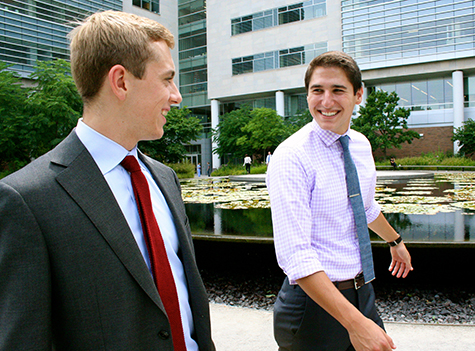As students return to the campus of Washington University in St. Louis and resume the routine of academic life, the civic-minded among them should remember an important deadline that’s just around the corner.
Applications for the Class of 2017 cohort of the Civic Scholars program, which now includes an option for those who plan to study abroad for a semester, are due Feb. 2. Information sessions take place Jan. 15 and 21.
The Civic Scholars program is an initiative of the Gephardt Institute for Public Service. Washington University’s premier program on civic leadership and engagement, it provides a select group of students from a highly competitive pool of applicants with two years of training and mentorship to prepare them for lifetimes dedicated to civic engagement.
The summer between students’ junior and senior years, scholars receive a $5,000 grant to apply the skills they’ve learned in the classroom to a civic project related to their area of interest.
Program Director Jenni Harpring said the program aims to get students thinking about how to be engaged citizens after college, whether in a direct way, such as running for political office, or making an impact in other ways, such as coaching Little League.
“The project is the beginning of how they see themselves as civic agents in the world,” Harpring said. “We are trying to help students see themselves as citizens who have agency to make changes and improvements in society.”
‘Where passion meets the need of the world’
Just one example of the student success stories from this program is a member of the Class of 2015 cohort of scholars, Jason Silberman. The senior in philosophy-neuroscience-psychology in Arts & Sciences plans to graduate this May.
When a developmentally disabled aunt of Silberman’s was diagnosed with Type II diabetes, it piqued his interest in the intersection of ability and medicine. Although he didn’t give a second thought to his aunt’s disability while growing up, by the time he reached high school, he began to see the challenges that medical professionals face when interacting with patients with disabilities.
“When my aunt was diagnosed with Type II diabetes, my family realized she needed to make changes to facilitate a healthy lifestyle,” said Silberman, who is a Stern Family Civic Scholar. “But for Estella, it was harder to understand those changes than it would be for you or me. For those with developmental disabilities, it might be harder for them to understand what their health means and how their daily choices can impact the rest of their lives.”

Last summer, Silberman collaborated with a team at the Washington University School of Medicine in St. Louis to review the literature on treating patients with disabilities and to craft standardized procedures for interacting with these individuals, an area traditional medical education doesn’t address.
“We came up with this checklist, and I came up with dialogue that a doctor might use to interact with a patient with disabilities,” Silberman said. “Anything from using person-first language, like saying someone is a patient with disabilities, instead of a disabled patient, to not leaning on a patient’s wheelchair, to being aware of a patient’s level of comfort if they need to sit or lie down during an examination.”
The committee’s final checklist could be used to evaluate filmed interactions of medical students with patients, and Silberman hopes it could be integrated into the medical school’s curriculum. His ultimate goal is to see the procedures published and incorporated into medical schools and hospitals across the country.
Silberman also applied his grant toward volunteering at LifeBridge Partnership, a nonprofit that offers a camp for children with disabilities. The experience helped him keep in mind the people who can benefit from his research.
“I think that sometimes when I’m at my computer doing research, you lose that connection you have with the actual patient,” Silberman said. “Volunteering at LifeBridge, you see children running around who one day might go into a physician’s office and benefit from that checklist, and that perspective and focus really gave me a greater appreciation of what I was doing and why I was doing it.”
Silberman ultimately plans to apply to medical school.
“Twenty years down the road, I see myself being a physician who is able to understand, or at least try to understand, people’s perspectives and experiences to provide the best possible health care for those patients,” Silberman said.
Harpring said the students’ experiences illustrate how the program makes a difference both for them and for society.
“Jason’s had these crystalline moments when he saw himself reflected in his work,” Harpring said. “I think Jason has been able to see himself as a doctor ready to facilitate services for a population that’s often forgotten. You can really see he has, at least in some small way, found where his passion meets the need of the world.”